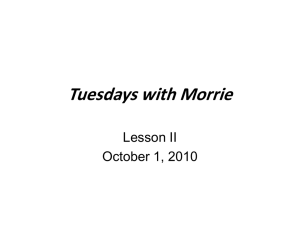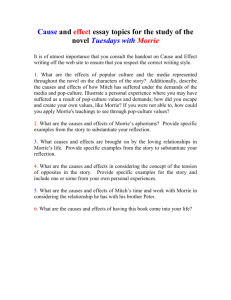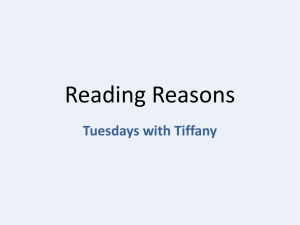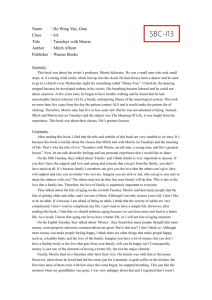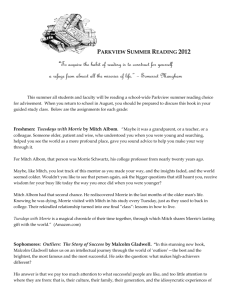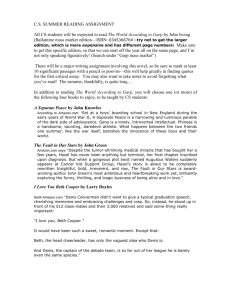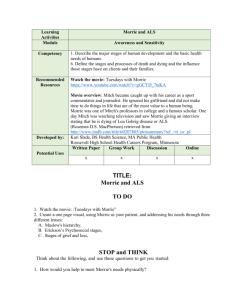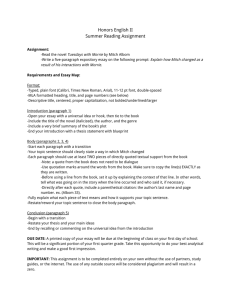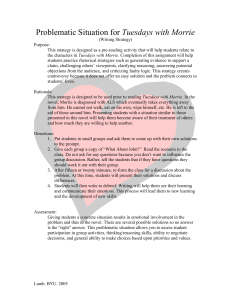“The Curriculum” – “The Audiovisual”
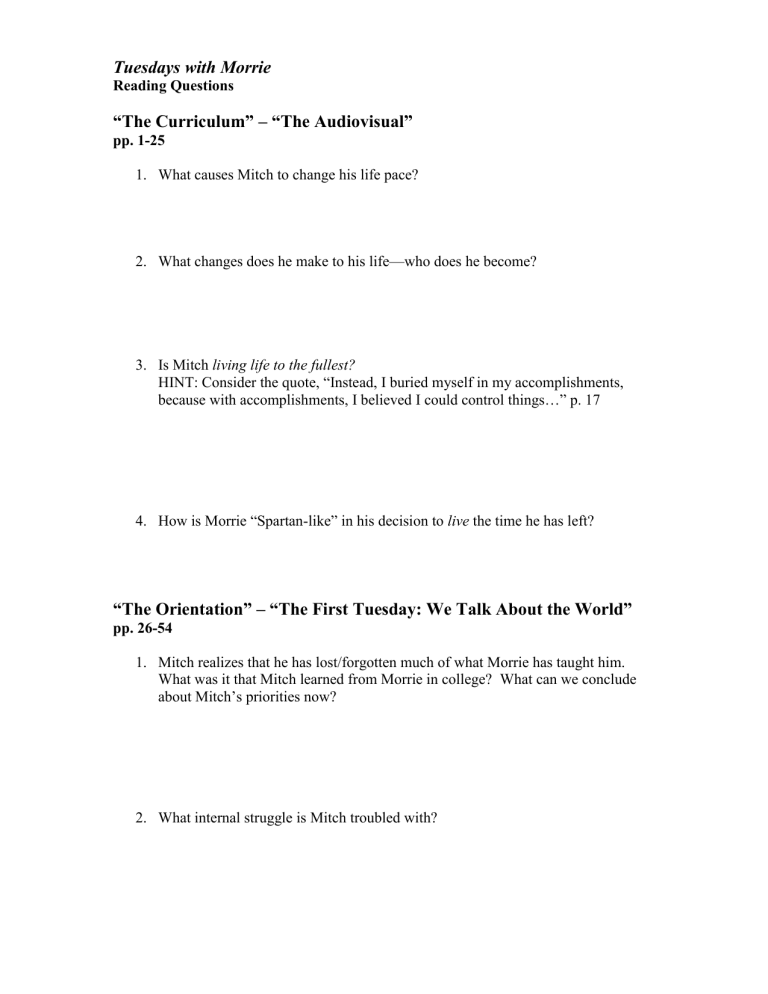
Tuesdays with Morrie
Reading Questions
“The Curriculum” – “The Audiovisual”
pp. 1-25
1.
What causes Mitch to change his life pace?
2.
What changes does he make to his life—who does he become?
3.
Is Mitch living life to the fullest?
HINT: Consider the quote, “Instead, I buried myself in my accomplishments, because with accomplishments, I believed I could control things…” p. 17
4.
How is Morrie “Spartan-like” in his decision to live the time he has left?
“The Orientation” – “The First Tuesday: We Talk About the World”
pp. 26-54
1.
Mitch realizes that he has lost/forgotten much of what Morrie has taught him.
What was it that Mitch learned from Morrie in college? What can we conclude about Mitch’s priorities now?
2.
What internal struggle is Mitch troubled with?
3.
What does Morrie mean when he says, “Dying is one thing to be sad over, Mitch.
Living unhappily is something else?” p. 35
4.
What are Morrie’s views on culture and society? How do these views reflect
Transcendental beliefs? (HINT: Refer to pp. 35-36; 42)
5.
Morrie told Mitch about the "tension of opposites." What does the “tension of opposites” mean? (p. 40) Give an example based on events in the book.
6.
Morrie explains how one can find the meaning of life. To what must one devote him/herself to in order to find the meaning of life? (HINT: Refer to p. 42)
7.
At the end of The First Tuesday, Morrie’s illness is advancing. What does
Morrie’s state as being the biggest struggle of his illness? How does he cope with it?
“The Second Tuesday: We Talk About Feeling Sorry for Yourself” –
“The Professor”
pp. 55-79
1.
Instead of mourning, what does Morrie concentrate on? Why? (HINT: Refer to p.
57)
2.
Why does Morrie consider himself to be so lucky? Why does Mitch have a hard time agreeing with his statement? (HINT: Refer to p. 57)
3.
Thinking back to Thoreau’s reason for publishing and sharing his experience at
Walden, explain Morrie’s purpose in stating the following quote:
“I want someone to hear my story. Will you?” p. 63
4.
Look closely at the bottom of page 63 and the top of page 66. Do you think clarity about life only comes with pending death? Explain.
5.
“…the culture doesn't encourage you to think about such things until you're about to die. We're so wrapped up with egotistical things, career, family, having enough money, meeting the mortgage, getting a new car, fixing the radiator when it breaks--we're involved in trillions of little acts just to keep going…” (p. 64) Why does Morrie suggest this is the case? How does this quote relate to Transcendental values?
6.
Consider Mitch’s thesis topic. Is America’s fascination/obsession with sports just that—a harmless pastime? Or, does it mean something more?
7.
What does Morrie mean when he says that talking and gesturing are how he gives to people? (HINT: Refer to p. 70)
8.
Consider what we’ve learned about Morrie’s experiences with his mother’s death and his brother’s illness. How has Morrie’s attitude towards death and illness changed since then? WHY? (HINT: Refer to pp. 74-75)
9.
When Charlie remarried, Morrie connected with Eva. “Morrie waited on those kisses like a puppy waits on milk.” What caused Morrie to need this affection?
(p. 76)
“The Fourth Tuesday: We Talk About Death” – “The Sixth Tuesday:
We Talk About Emotions”
pp. 80-107
1.
What is the significance of Mitch recalling the traumatic events in the news?
What effect does it have on you as a reader? (HINT: Refer to pages 58, 81)
2.
“Everyone knows they’re going to die, but nobody believes it” (p. 81). Do you agree with this quote? Explain.
3.
Compare the above quote to the following: “But there’s a better approach. To know you’re going to die, and to be prepared for it at any time” (p. 81). Do you agree? Do you think both quotes go together—or, is one better than the other?
Explain.
4.
Morrie says, “once you learn how to die, you learn how to live” (p. 82). Do you think this is true? Can you learn to live your life meaningfully before learning how to die? Explain.
5.
How does the following quote mirror Thoreau’s excerpt from
Walden ? What is
Morrie saying here?
“You strip away all that stuff and you focus on the essentials. When you realize you are going to die, you see everything much differently” (p. 83).
6.
Why does Morrie appreciate nature more now than he did before? What is the significance of nature to Morrie? (HINT: Refer to p. 84)
7.
Through Morrie’s Nightline appearance, hundreds of people heard his story. Why do you think so many people responded the way they did? (HINT: Refer to p. 86)
8.
Explain why Morrie disagrees with Lou Gehrig’s famous line. (HINT: Refer to p.
89)
9.
Why do you think Morrie craves human contact and affection at this point in the story? (HINT: Refer to p. 91)
10.
What does the following quote say to you? “Love each other or perish” (p. 91).
11.
How would Morrie respond to the commonly asked question: “Is it better to love and be hurt than never to love at all?” Explain
12.
Morrie preaches about the importance of having close family to get one through difficult times. Why do you think Mitch’s brother pushed away his family during his fight with cancer?
13.
How does Morrie define detachment ? Why does he say it’s so essential to life, living and dying? (HINT: Refer to pp. 103-106) Explain.
“The Professor, Part Two” – “The Ninth Tuesday: We Talk About How
Love Goes On”
pp. 108-141
1. What lesson did Morrie learn from working in the mental hospital? How does this lesson support the Transcendental value of quality of life and happiness? (HINT: Refer to p. 111)
2. Consider the general faculty’s reaction at Brandeis to the Vietnam war. How did the professors’ teaching styles change? Do you see any Transcendental values embodied in their actions? Explain (HINT: Refer to pp. 111-113)
3. What are your views on afterlife? Do you think Morrie would agree or disagree with the Arctic tribe’s belief that a person’s soul surpasses death? Why or why not? Explain
(HINT: Refer to p. 114)
4. Mitch is disturbed by the billboards and media and their portrayal of humans and aging. What do the billboards suggest? Can we draw any conclusion about society’s stance or opinion on growing older? Explain (HINT: Refer to pp. 117-118)
5. Refer to your answer above. What is Morrie’s take on getting old? How does
Morrie’s perspective on aging contradict popular belief?
6. What is it that Morrie says people have been brainwashed to believe? Do you agree or disagree with his claim? Where do we see the results of this said brainwashing in our society? Give examples. (HINT: Refer to pp. 124-125)
7. By no means is Morrie a rich man; he lives a modest life. What does Mitch mean when he says that Morrie’s house “had become, in a very real way, a wealthy home…”
(p.126)? Explain
8. Considering your life experiences and what you’ve learned so far from reading
Tuesdays with Morrie , what does the following quote mean to you?
“Each night, when I go to sleep, I die. And the next morning, when I wake up, I am reborn.”
9. What explanation does Morrie give to the people who neglect to pay full attention during a given conversation? Why is it IRONIC that these same people are so drawn to conversing with Morrie? Explain (HINT: Refer to pp. 136-138)
10. So often we hear the saying: one is the product of his or her environment . How is it that Morrie became so different from his father when his father was all he ever knew growing up? Explain. (HINT: Refer to pp. 138-140)
“The Tenth Tuesday: We Talk About Marriage” – “The Twelfth
Tuesday: We Talk About Forgiveness”
pp. 142-170
1. Why do you think Morrie wanted to meet Janine? Why do you think Janine agreed to visit Morrie with Mitch? Explain (HINT: Refer to pp. 142-144)
2. At Morrie’s request, Janine sings for him. Why does this surprise Mitch? What is it about Morrie that inspired Janine to sing? (HINT: Refer to p. 146)
3. What does Mitch mean when he says, “In all the years I have listened to my wife sing,
I never heard her the way he did at that moment” (p. 147). Explain
4. Mitch now stays with Morrie when specialists work with him; Mitch even helps with
Morrie’s physical therapy, and the two hold hands regularly. What has caused Mitch to be less embarrassed about Morrie’s vulnerable state and more comfortable being around him in this capacity? (HINT: Refer to pp. 152-155)
5. What does Morrie mean when he says, “people are only mean when they are threatened” (p. 154). Do you agree or disagree? Provide a real life example that supports your claim.
6. What is the significance of Morrie “sitting on the toilet” while everyone else in
America watched the verdict of the O.J. Simpson trial? (HINT: Refer to p. 157)
7. One of Morrie’s last aphorisms was, “don’t let go too soon, but don’t hang on too long” (p. 162). What does this quote mean to you? How does this quote relate to Morrie and his struggle? Explian
8. Morrie is brought to tears when he recalls his lost friendship with Norman. Why does
Morrie have regrets about losing touch with Norman? What does Morrie tell Mitch is even more important than forgiving others? WHY? Explain.
9. Consider Morrie’s health, and the connection he feels with nature. What could the hibiscus plant symbolize? (HINT: Refer to p. 167)
10. What’s the significance of where Morrie wishes to be buried? Does his request reflect any Transcendental values? Why or why not? Explain (HINT: Refer to p. 170)
“The Thirteenth Tuesday: We Talk About the Perfect Day” – “The
Fourteenth Tuesday: We Say Goodbye”
pp. 171-186
1.
According to Morrie, how are we different from plants and animals? Do you agree or disagree with Morrie’s claim? Explain (HINT: Refer to p. 173-174)
2.
“In all the time he was sick, Morrie never held out hope that he would be cured”
(p. 174). What do you think Morrie’s rationale was for doing this? Do you think it was the correct thing to believe? Why or why not? Explain.
3.
What would Morrie’s ideal day be like if he could be healthy again for 24 hours?
Why is Mitch initially disappointed by Morrie’s “perfect day?” What does this say about Morrie? About Mitch?
4.
Look closely at the passage on pages 179 and 180. How can you relate Morrie’s story about the wave and the ocean to human life in general? Morrie’s life in particular? Explain.
5.
Mitch does not know how to say good-bye to Morrie. How does Morrie advise
Mitch? How do the two say good-bye?
Having finished the story and the movie, write a paragraph (5-7 sentences) describing your reaction to the story as a whole?
How did the story of Morrie Schwartz affect you?
What did you learn from reading the book?
What connections did you make with the characters?
________________________________________________________________________
________________________________________________________________________
________________________________________________________________________
________________________________________________________________________
________________________________________________________________________
________________________________________________________________________
________________________________________________________________________
________________________________________________________________________
________________________________________________________________________
________________________________________________________________________
________________________________________________________________________
________________________________________________________________________
________________________________________________________________________
________________________________________________________________________
________________________________________________________________________
________________________________________________________________________
